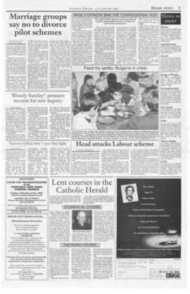Page 6, 31st January 1997
Page 6

Report an error
Noticed an error on this page?If you've noticed an error in this article please click here to report it.
Tags
Share
Related articles
No Women Forgotten In This Prayerbook By Sister Loretto
Office Hours
Music
Visible Choirs Needed
New Hymn Book
A very English book
PETER JONES welcomes a new monastic hymnbook
Hymns For Prayer and Praise, ed. John Harper, The Canterbury Press, Norwich
THIS book is a welcome addition to the once rather stilted repertoire of liturgical office hymns in the vernacular, aimed at religious communities, churches and individuals.
The three-volume Divine Office (1974) was sadly lacking in that it provided strangely truncated versions of office hymns, disregarding the great wealth of Catholic poetry from previous Breviary translations and hymnals. The revised Latin edition of the office has always had a fuller collection of hymns, many of them new, which also appeared in the Liber Hymnarius of Solesmes with music.
This present volume from the Canterbury Press is an impressive attempt, offering about two-thirds of the Latin output in English translation, welcome indeed for those who wish to say or sing their daily offices with more correct liturgical observation. It favours the familiar metre of plainsong hymns for the most part, with the choice of simple Gregorian melody and an alternative metrical melody for each hymn. The simple plainsong (which is well thought out) will, I think, be the reason for its popularity.
I know how difficult it is to edit music especially when working with texts, but it is the latter that I am more concerned about. If the Liber Hymnarius was the starting point, then I am puzzled by the often incorrect placing of the hymns in the Diurnal (ordinary time) section, especially for Sundays, and the absence of the change of hymns during Advent on December 17.
Also missing are some important Lenten allocations, the Dies Irae for the week before Advent and many vigil hymns for recitation during the night. Most of these are in fact available in translation.
But the Introduction to Hymns for Prayer and Praise gives many reasons for editing and choice, and this is a very "English" book. Purists will not find everything they need and should refer to Thomas Cooper's more definitive collection The Roman Hymnal of 1992.
Hymns for Prayer and Praise is a well-presented book which is accessible to all, especially in its use of music. One would sincerely hope that this (and the fuller work done by Fr Cooper) will be considered for inclusion in any future revision of the Divine Office in the vernacular.
blog comments powered by Disqus











